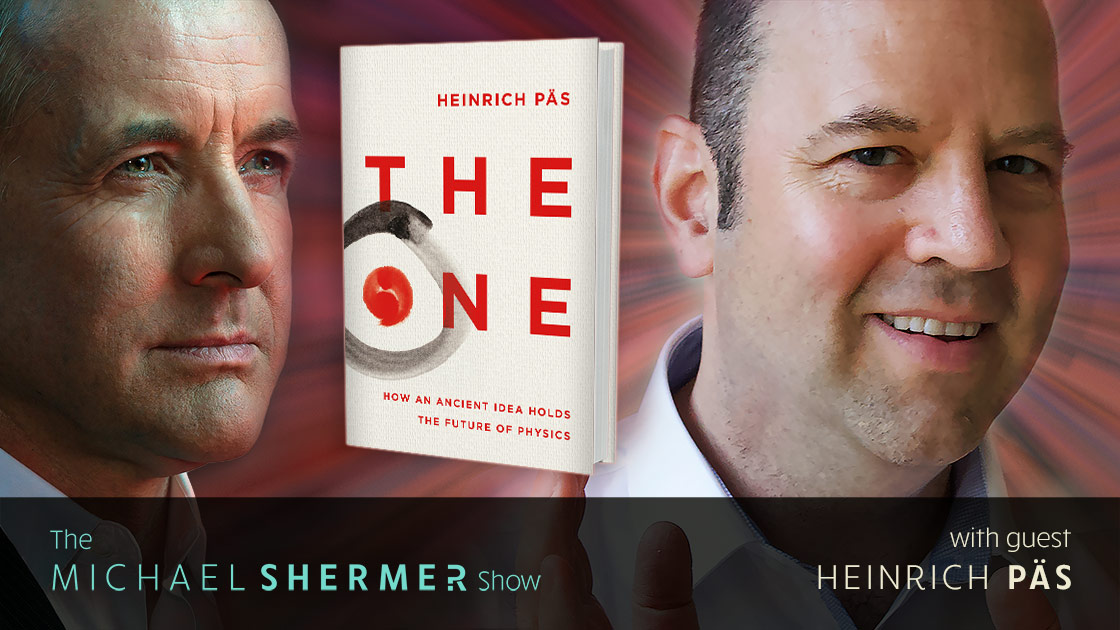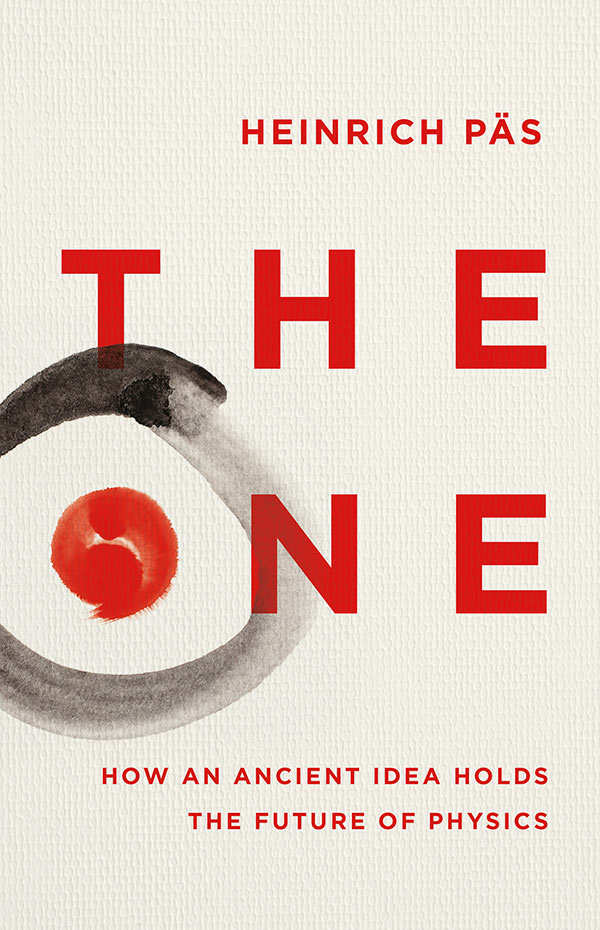“From all things One and from One all things”
Heinrich Päs is a professor of theoretical physics at TU Dortmund University in Germany. He has held positions at Vanderbilt University, the University of Alabama, and the University of Hawai’i and has conducted research visits at CERN and Fermilab. He lives in Bremen, Germany. His new book is The One: How an Ancient Idea Holds the Future of Physics.
Shermer and Päs discuss:
- monism vs. dualism
- What is time?
- Is math all there is? Is math universal?
- the double-slit experiment
- superposition
- What is a field?
- metaphors in science: world as machine, world as alive
- limitations of models and theories of reality
- limitations of analogies between western physics and eastern mysticism
- The Tao of Physics and other connections between quantum physics and Eastern mysticism
- What banged the Big Bang?
- Why is there something rather than nothing?
- Are we living in a matrix?
- the Second Laws of Thermodynamics and directionality in nature
- If everything runs down how did any complexity form after the Big Bang?
- laws of nature: discovered or created or both?
- Is the universe mathematical?
- Model Dependent Realism and the nature of reality
- consciousness and self-awareness as emergent properties
- Is there purpose in the cosmos?
- Is there a place for God in scientific epistemology?
- The “fine-tuning” of the universe and Intelligent Design creationism
- mysterian mysteries: are there things we can never know, even in principle? String theory, the multiverse, consciousness, the origin of the universe, and why there is something rather than nothing: are these soluble problems?
About the Book
In his new book, The One, particle physicist Heinrich Päs presents a bold idea: fundamentally, everything in the universe is an aspect of one unified whole. The idea, called monism, has a rich three-thousand-year history: Plato believed that “all is one” before monism was rejected as irrational and suppressed as a heresy by the medieval Church. Nevertheless, monism persisted, inspiring Enlightenment science and Romantic poetry. Päs aims to show how monism could inspire physics today, how it could slice through the intellectual stagnation that has bogged down progress in modern physics and help the field achieve the grand theory of everything it has been chasing for decades.
Blending physics, philosophy, and the history of ideas, The One is an epic, mind-expanding journey through millennia of human thought and into the nature of reality itself.
Show Notes
Albert Einstein on the death of his friend Michele Besso in a letter to the family:
Now he has departed from this strange world a little ahead of me. That means nothing. For us believing physicists the distinction between past, present, and future only has the meaning of an illusion, though a persistent one.
Sir Martin Rees’s Just Six Numbers
- Ω (omega), the amount of matter in the universe = 1: if Ω were greater than 1, it would have collapsed long ago, and, if Ω were less than 1, no galaxies would have formed.
- ε (epsilon), how firmly atomic nuclei bind together = 0.007: if ε were even fractionally different, matter could not exist.
- D, the number of dimensions in which we live = 3.
- N, the ratio of the strength of electromagnetism to that of gravity = 1039: if N were smaller, the universe would be either too young or too small for life to form.
- Q, the fabric of the universe = 1/100,000: if Q were smaller, the universe would be featureless, and, if Q were larger, the universe would be dominated by giant black holes.
- λ (lambda), the cosmological constant, or “antigravity” force that is causing the universe to expand at an accelerating rate = 0.7: if λ were larger, it would have prevented stars and galaxies from forming
Why is there Something Rather Than Nothing?
From Michael Shermer’s essay of this title in Giving the Devil His Due:
Nothing is Inconceivable.
The argument that asks why there is something rather than nothing underlies all the other arguments, and is cognitively challenging because it is simply not possible for existing beings to imagine not existing — not just themselves existing (which forms the cognitive foundation of afterlife beliefs), but to imagine nothing existing at all. Go ahead and try it. Picture nothing. When I ask myself this question I start by visualizing dark empty space bereft of galaxies, stars, and planets, along with molecules and atoms. But this picture is incorrect because if there were no universe there would not only be no matter, but there would be no space or time (or space-time) either. There would be absolutely nothing, including no conscious being to observe the nothingness. Just…nothing. Whatever that is.
First, as suggested above, it is impossible to conceptualize nothing — no space, time, matter, light, darkness, or even any conscious beings to perceive the nothingness. As Robert Kuhn conceives it: “Not just emptiness, not just blankness, and not just emptiness and blankness forever, but not even the existence of emptiness, not even the meaning of blankness, and no forever.”1 Inconceivable.
Nothing is Something.
The analytical philosopher Quentin Smith pointed out to Kuhn that it is a logical fallacy to talk about “nothing” as if it were “something”; that is, to suggest that “there might have been nothing” implies “it is possible that there is nothing.” As Kuhn articulates Smith’s argument: “‘There is’ means ‘something is.’ So ‘there is nothing’ means ‘something is nothing,’ which is a logical contradiction.
Nothing Would Include God’s Nonexistence.
In Kuhn’s taxonomy of “nothings” he lists what categories of things might be included in “something” that would be negated by “nothing”: physical, mental, platonic, spiritual, and God. Physical: all matter, energy, space and time, and all the laws and principles that govern them (known and unknown). Mental: all kinds of consciousness and awareness (known and unknown). Platonic: all forms of abstract objects (numbers, logic, forms, propositions, possibilities — known and unknown). Spiritual and God: anything that could possibly fit this nonphysical category (all forms of religious and spiritual belief).2 If by “nothing” is meant no physical objects or matter of any kind, for example, there can still be energy from which matter may arise by natural forces guided by the laws of nature. Physicists, for example, talk about empty space as seething with virtual particles, from which particle-antiparticle pairs come into existence as a consequence of the uncertainty principle of quantum physics. From this “nothingness” universes may “pop” into existence.3
But if by “nothing” is meant that there is no physical, mental, platonic, or nonphysical entity of any kind, then there can be no God or gods, which means that there cannot be anything outside of nothing out of which to create something. If God is proposed to be outside of or preexisting the “nothing” from which the “something” was created, then why can’t the laws of nature that give rise to “somethings” (like universes) be outside of or preexisting nothing?
References
- Kuhn, Robert Lawrence. 2007. “Why This Universe?: Toward a Taxonomy of Possible Explanations.” Skeptic, Vol. 13, No. 2, 28–39.
- Kuhn, Robert Lawrence. 2013. “Levels of Nothing: There Are Multiple Answers to the Question of Why the Universe Exists.” Skeptic, Vol. 18, No. 2. http://bit.ly/1S7Mn9i
- Vilenkin, Alex. 2006. Many Worlds in One: The Search for Other Universes. New York: Hill and Wang.
If you enjoy the podcast, please show your support by making a $5 or $10 monthly donation.
This episode was released on February 18, 2023.










